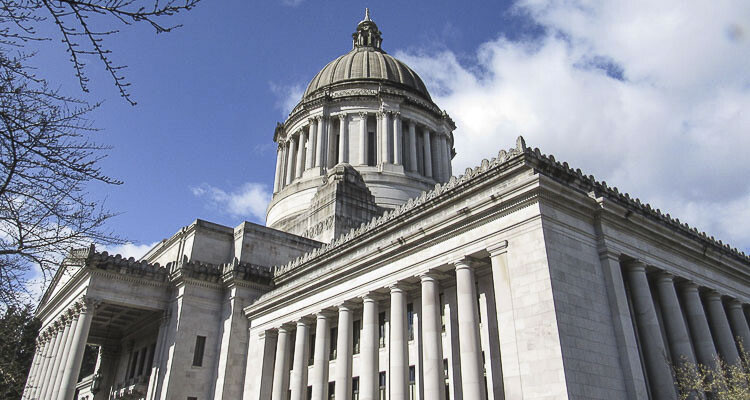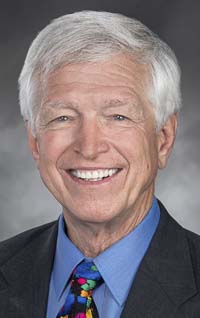
Rep. John Ley offers his insight on the new budget proposals in the legislature
Rep. John Ley
for Clark County Today
Hang on to your wallets, folks! House and Senate budget proposals were released this week for the general fund operating budget and the transportation budget. Both are loaded with new and increased taxes that will hit your family hard.

There’s an assault underway that will make living and working in Washington state even more unaffordable. We are already the fourth most expensive state in which to live. Every single person contacting my office this year has, in one way or another, talked about how hard it is to make ends meet.
The budget proposals revealed this week show that the majority party wants to tax you by an additional $20 billion per year. Added to this is an unspecified huge tax increase in city, county, port, fire, school, and transportation benefit districts. Future taxes would be allowed to grow, automatically indexed to inflation, population growth, or other factors.
The House Democrats’ operating budget raises spending by $6 billion over current levels. This represents an 8 percent increase. This will be the fourth consecutive operating budget that spends more than the state takes from you in taxes.
Democrats demand record levels of new tax revenue to justify their increased spending. However, this will make Washington even less affordable. Over the four-year budget cycle, they want to take an additional $15 billion from you for the government’s operating budget. Added to that are another $4.4 billion in Transportation taxes. That’s almost $20 billion in new taxes going to the state.
Taxes allocated for the operating budget are derived from three primary sources.
First, the constitutional 1 percent cap on property tax increases would be eliminated. One option calls for raising this to a 3% increase each year, while another option would add population growth and inflation to continual property tax increases. The state portion would require an additional $818 million to be taken out of people’s pockets. The compounding effect of this policy change means this $800 million turns into many billions within just a few years beyond the forecasted horizon for the state alone.
Second, is significant tax increases on businesses and job creators. But because your cities, counties, ports, fire districts, and other special taxing authorities will likely raise property taxes to this new level, it would take additional billions out of family budgets.
There are increases in existing Business & Occupation (B&O) tax rates of $6.9 billion. Large employers would also pay a “head tax.” Senate Democrats have a 5 percent tax on payroll expenses for employers, specifically targeting those with payrolls above $7 million. This would generate an estimated $2.3 billion in revenue and penalize people who create jobs in our state.
Third is a “wealth tax” on over 4,000 super-wealth individuals. They hope these wealthy people will not follow Jeff Bezos and Clark County’s Ken Fisher who have already left the state to avoid the capital gains tax. The budget assumes about $7 billion from an “Intangibles Assets Tax.”
Meanwhile, transportation taxes will add significant costs to owning and driving a car. This will also add to your grocery bill, as retailers will likely pass the increased costs on to consumers. The total proposal raises $4.4 billion.
Your gas tax will increase by another 9 cents per gallon, with future annual increases tied to the price deflator for personal consumption expenditures (PCE) in 2026. Diesel, propane, and biodiesel taxes will increase by an additional 3 cents in July and another 3 cents in July 2027, with annual increases scheduled for 2028. That is in addition to the 9-cent increase mentioned above.
Passenger vehicle weight fees will increase by $10 to $24, depending on the vehicle.
There is a separate sales tax on vehicles, presently 0.3 percent. This tax will increase to 1 percent on the first $50,000, 2 percent on non-commercial vehicles between $50,000 and $100,000, and 3 percent for over $100,000.
Washington’s gas tax is already the third highest in the nation, behind California and Pennsylvania, according to the U.S. Energy Information Administration. The Senate gas tax proposal would raise $1.5 billion from you over the next six years, while the House version would add $1.8 billion according to news reports.
On top of these taxes, the cost of almost everything you buy will also go up due to the state’s Climate Commitment Act. The most recent CO2 auction reports a 24 percent jump in the price since the last auction in December. Over the past six months, the price of CO2 allowances has increased by 67 percent.
The cost of Washington’s CO2 tax is now $0.39 per gallon of gas and $0.48 per gallon of diesel. The costs of these CO2 allowances are passed on to consumers at the pump. At the end of last year, the CCA had already taken $3 billion from Washington families.
The Democrat majority seems to believe the people are an ATM from which they can extract unlimited amounts of money. The people are telling me, “Enough!” You can’t afford to have the government take more of your hard-earned money.
The debate highlights a broader tension: striking a balance between the spending preferences of the majority party and the affordability concerns of its citizens. For now, the proposals remain just that – proposals – subject to revision or rejection as the legislative process unfolds.
I will be fighting with my republican House colleagues to reduce or eliminate these tax increases. Sadly, given the Democratic majorities in both the House and Senate, most or all of these new and increased taxes are likely to become law. Our main hope is that Governor Bob Ferguson will stand firm and veto these increased taxes.
Rep. John Ley, R-Vancouver, represents Washington’s 18th Legislative District.
Also read:
- WA governor pressed to veto $1.8B piece of Democrats’ tax billGrocers and restaurateurs are urging Gov. Ferguson to veto a surcharge in HB 2081 that they say will raise food prices statewide.
- Letter: ‘It’s said sarcasm is the lowest form of wit’Amboy resident Thomas Schenk criticizes Olympia’s use of “emergency clauses” and other legislative tactics that limit public participation.
- Opinion: What the 2025 legislature tells us about why Washington’s government keeps failingTodd Myers of the Washington Policy Center argues that Washington’s government fails because it resists humility, experimentation, and accountability in its policymaking.
- Town hall: Republicans say they are the ones fighting for the working classFour Republican legislators gathered in Battle Ground for a town hall to address rising taxes, education concerns, and their push to support Washington’s working class.
- Pooneh Gray Files for Vancouver City CouncilPooneh Gray has filed to run for Position #1 on the Vancouver City Council, emphasizing public safety, homelessness solutions, and community justice.










